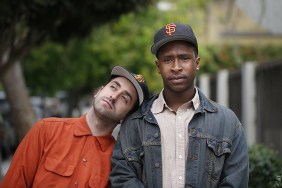Cast:
Johnny Depp as Paul Kemp
Aaron Eckhart as Hal Sanderson
Michael Rispoli as Sala
Amber Heard as Chenault
Richard Jenkins as Lotterman
Giovanni Ribisi as Moburg
Amaury Nolasco as Segurra
Marshall Bell as Donovan
Bill Smitrovich as Mr. Zimburger
Julian Holloway as Wolsley
Bruno Irizarry as Lazar
Enzo Cilenti as Digby
Aaron Lustig as Monk
Tisuby González as Rosy
Natalia Rivera as Chenault’s Friend
Directed by Bruce Robinson
Story:
Writer Paul Kemp (Johnny Depp) has arrived in Puerto Rico and taken a job at the San Juan Star writing horoscopes for the failing newspaper, but when he meets the wealthy Hal Sanderson (Aaron Eckhart) and his attractive, flirtatious girlfriend Chenault (Amber Heard), Kemp finds himself caught up in all sorts of dangerous local politics.
Analysis:
Adapting the work of gonzo journalist Hunter S. Thompson to the screen and then getting people to see the results has been just as challenging as filmmakers trying to adapt Philip K. Dick, so one has to at least partially appreciate the effort by Bruce Robinson and long-time Thompson enthusiast Johnny Depp in keeping the legendary journalist’s work alive.
Having already played Thompson in “Fear and Loathing in Las Vegas,” Depp plays American writer Paul Kent who gets a job in San Juan, Puerto Rico who gets into all sorts of misadventures with his photographer Sala. Kent soon gets in over his head when he meets well-to-do businessman Hal Sanderson (Aaron Eckhart) and his alluring girlfriend (Amber Heard).
Robinson does a decent job with the adaptation, but the film thrives whenever he quotes directly from Thompson, because that’s where it’s the most obvious why the novel was worth adapting in the first place. The humor is fairly down-played except for a number of great sight gags as we follow Kent and his photographer Sala’s drunken antics, which includes one of the funniest scenes you’re likely to see in the movie. Even so, “The Rum Diary” isn’t a comedy and having such a riotous scene inserted in an otherwise dry drama makes the film feel uneven, and there is just something that feels off about the film.
There are certainly Thompsonesque quirks to Kemp, particularly his proclivity for raiding his hotel mini-bar as the film opens, but after that, Depp gives a fairly low-key performance, mostly observing and not even drinking as much rum as the title may imply. Anyone expecting Depp to play another Jack Sparrow-like character might be surprised by how little of the eccentric mugging he does in this one.
In fact, it’s Giovanni Ribisi who gets the honors of playing a character that’s most quintessentially Thompson, a gravel-voiced drunk named Moburg who comes in and out of the story with no particular regularity. Richard Jenkins gives a solid performance as Kent’s editor-in-chief, delivering a compelling Thompson monologue about Puerto Rico, but even more impressive is the comic performance by Michael Rispoli, who goes toe to toe with Depp. We’ve certainly seen better from Amber Heard, who seems to have been hired mainly as eye candy that is eventually swept under the rug for the third act. Then there’s Aaron Eckhart who seems to be stuck in a rut where he can only play one mood and tone at any given time, and he really sucks the life out of the air whenever he’s on screen.
The travelogue nature of the story makes for a terrific looking film, as Robinson uses the Caribbean setting to its fullest without ever glossing over the seedy underbelly of the city and how the locals hate the ever-present gringos who are there just to take from them. If you don’t know a lot about the politics of Central America during the early ’60s, then a lot of the subplot about Sanderson’s plan to develop a nearby island and its implications may be lost on you.
The only time it approaches the LSD-fueled insanity of Terry Gilliam’s film is a scene when Paul and Sala take acid via eyedropper and they start seeing things, but Robinson also keeps things interesting with a number of interesting visual ideas, though it’s not consistent. Robinson also uses the cleverly selected songs in the soundtrack to keep the mood of the film light, which works sometimes better than others. The last act is where it falters the most, getting darker and further off-track from what Robinson set up earlier, so it’s hard to decide whether the ending is satisfying or just pat.
The Bottom Line:
Fans of Hunter S. Thompson may appreciate the way his words are realized, but the story is fairly flat and for every memorable moment or line that gets a laugh, there’s a lot of dry exposition that results in a somewhat unfocused effort.








